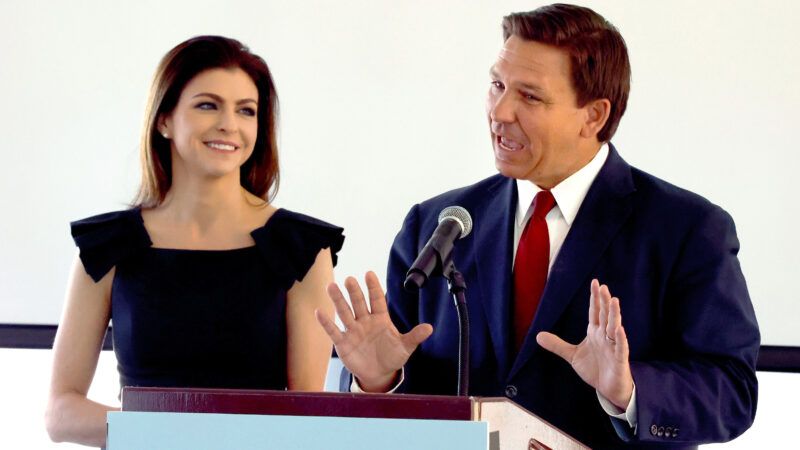Andrew Cuomo, Ron DeSantis Announce Major Rollbacks of Pandemic Restrictions
Two governors defined by their differing approaches to COVID-19 are both moving in the same direction.

New York and Florida had famously different responses to the pandemic, the former being especially restrictive, the latter being much more permissive. Today, the governors of both states announced major rollbacks of COVID-19 regulations.
In Florida, Republican Ron DeSantis issued an executive order suspending all local governments' emergency pandemic orders, including mask mandates.
"I think that's the evidence-based thing to do," he said today at a news conference. "I think folks that are saying they need to be policing people at this point, if you're saying that, then you're really saying you don't believe in the vaccines."
DeSantis announced his executive order at a signing ceremony for S.B. 2006. That bill ends all local emergency orders by July 1, as well as amending Florida's laws to make it harder for both states and localities to shut down businesses and schools. The governor's order is meant to bridge the gap between now and when the bill goes into effect.
These moves effectively move Florida, always one of the looser states in terms of COVID restrictions, back to a pre-pandemic state of affairs, combined with a few new checks on government emergency powers.
The governor's order frustrated several local officials who had proactively pushed mask mandates. DeSantis has already canceled fines received by individuals and businesses for violating local emergency orders, prompting some counties to stop enforcing theirs entirely.
Meanwhile, Democratic Gov. Andrew Cuomo announced that come May 19, New York would be lifting most capacity restrictions, including those on bars and restaurants.
"The tide is turning against COVID-19 in New York, and thanks to our increasing vaccination rates, as well as our successful, data-based regional approach, we're able to take more steps to reopen our economy, help businesses and workers, and keep moving towards returning to normal" he said.
In New Jersey, another Democratic governor—Phil Murphy—announced that his state would be repealing its business capacity restrictions on May 19 as well.
Both Cuomo and Murphy's reopenings come with the proviso that people still need to maintain six feet of distance from each other. Large indoor event venues will be allowed to increase their capacity to 30 percent, up from the current 10 percent. Attendees will also have to show a negative COVID test or proof of vaccination.
The bill signed by DeSantis today prohibits schools, local governments, and businesses from requiring people show proof of vaccination. The governor had issued an executive order also banning these vaccine "passports" last month.
Other states known for restrictive lockdowns have also started to ease up on their pandemic regulations. That includes California, where embattled Democratic Gov. Gavin Newsom has said that all capacity restrictions on businesses will be lifted come June 15, provided COVID-19 deaths remain low in the state and there's enough vaccine supply to meet demand.
Aside from the prohibition on private parties requiring proof of vaccination, these are welcome moves. It's particularly heartening to see both red and blue states moving in the same direction. It's a demonstration not just that pandemic regulations are broadly unpopular, but that they are increasingly seen as unnecessary, given the availability of vaccines and the falling number of COVID-19 cases and deaths.
That hope that vaccinations would, at last, remove the justification for these emergency public health restrictions is largely being borne out.
This bipartisan reopening does make the restrictions that still exist more grating. In his remarks today, DeSantis noted D.C.'s ban on people standing at indoor weddings. One hopes that as more states lift their pandemic regulations, those rules too will fall by the wayside.
Rent Free is a weekly newsletter from Christian Britschgi on urbanism and the fight for less regulation, more housing, more property rights, and more freedom in America's cities.


Show Comments (58)